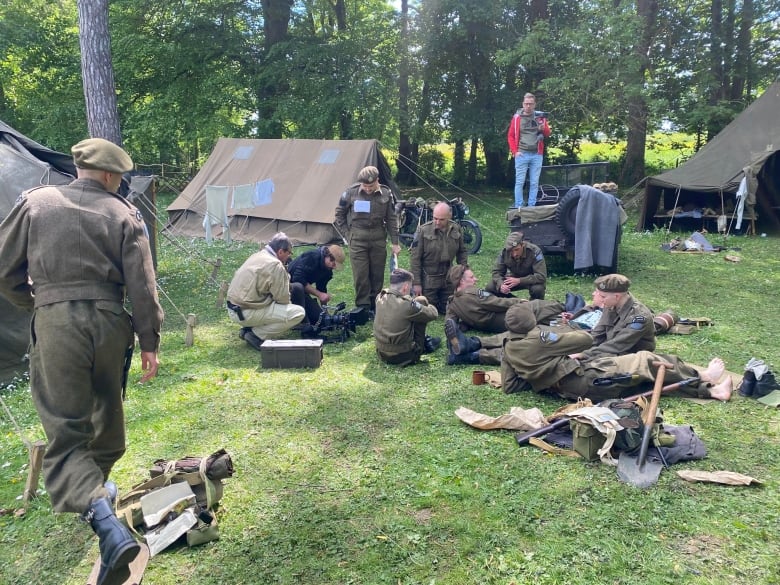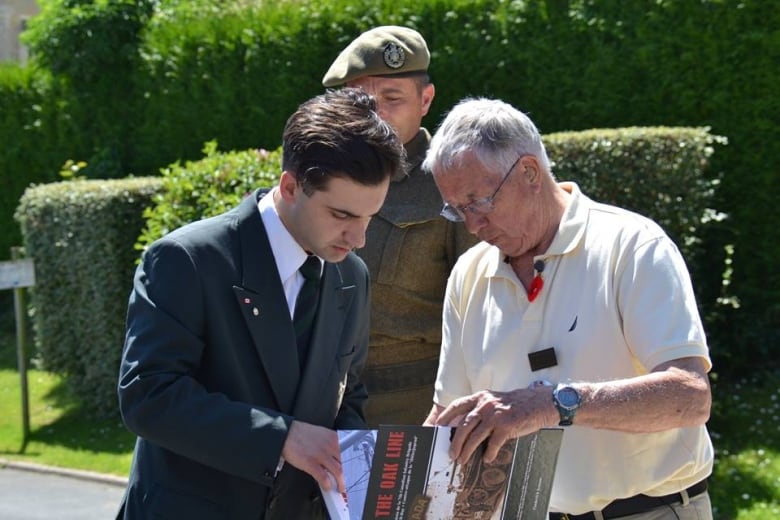79 years after D-Day, friends in Normandy are making a film to honour Canadian regiment | CBC News
A group of friends in Normandy, made up of historians and museum employees, is working to bring Canadian sacrifices to the screen.
Little Black Devils — From Juno to Putot is an upcoming Second World War documentary that will tell the story of the Royal Winnipeg Rifles Regiment from the days leading up to D-Day through to their battle with the German 12th SS Panzer Division near the French village of Putot.
Leading the charge on the film was the late Frederick Jeanne, who was particularly passionate about the role of the Canadian troops who had liberated his home village in Normandy. Jeanne had already written Hold The Oak Line, an illustrated history of the 7th Canadian Infantry Brigade.

According to another of the filmmakers, Julien Martin, who works at the D-Day Experience Museum in Normandy, the idea for a film came about while the friends were all chatting one night.
“We said to each other, quite candidly, quite naively, ‘guys, it would be great if we made a film. It would be great to have something concrete about this unit, about these men,'” he said.
Since then, the group have overcome the hurdles of indie filmmaking, cobbling together a six figure budget from donations they sought out in their spare time. They’ve also had to move forward following the sudden death of Jeanne, the main driving force behind the film, in early 2023 at age 36.
Tim Cook, chief historian and director of research at the Canadian War Museum, says it’s rare to see another country depict a Canadian war experience on the screen.
“Often our history is ignored by Americans, by British, by French, by Germans and others,” he said.
Cook said he was pleased to learn of the project. “We need to work hard to ensure that the past is not forgotten and this falls into that.”
WATCH | Little Black Devils Trailer:
After the idea was hatched, Jeanne, Martin and the group brought the idea to management at the museums where they worked, who agreed to provide some financial support. They were also able to raise funds from local businesses and through individual donations from platforms like Leetchi and GoFundMe.
Even with significant volunteer contributions in the form of food, transportation, and labour of the cast and crew, the budget is around €100,000 (about $150,000 Cdn).
Being historians first and filmmakers second, Martin says accuracy is their chief concern.
“We don’t want approximations, or ‘close enough’, we really want it to be perfect.”
A portion of the filming was completed last year, but the bulk of the work is still to come, according to Martin.
The group is planning to release the film in time for the 80th anniversary of D-Day, June 6, 2024, and donate it to schools in the Normandy region, and to any Canadian schools that would be interested.
Winnipeg regiment supporting the film
Among those donating funds are members of the very regiment the film will honour.
Major Richard Desjardins, president of the Royal Winnipeg Rifles Association, says the group is supportive of the project, and that many members of the regiment have given personal donations to the film.
The filmmakers have also collaborated with one of the Canadians who stormed Juno beach on D-Day, Jim Parks, a 98-year-old veteran who had lied about his age to join the Winnipeg Rifles with his brother. Parks and Jeanne first met more than a decade ago, and were in frequent communication, both remotely and in visits on both sides of the Atlantic.
Desjardins says this isn’t the first time they’ve received appreciation and recognition from people in Normandy, remembering in particular previous visits to commemorate the anniversary of D-Day.

“[Local groups] were there making sure that we had transportation, there was food, that we had accommodation, rental cars were booked,” he said. “Monuments were lined up for us to go dedicate, but they had raised the money to raise the monuments.”
“This is a group of French citizens that are just so appreciative of having been liberated that they don’t forget. They understand that their freedom cost something.”
After Jeanne’s unexpected death near the beginning of the year, the rest of the filmmakers were resolved to see the film through.
“The news took us all by surprise,” said Martin. “This project was so close to his heart, he was so dedicated to making it happen, we said to each other that the best tribute we can pay him would be to finish this film,” he said.
“That way, from wherever he is, he can be proud of us.”
Parks, who will be played in the film by Marceau Loudiere, shared memories of Jeanne in a video on the film’s Facebook page.

“His knowledge of what the Canadians did in his area of Normandy was very extensive,” Parks said. “He didn’t keep the knowledge to himself, and he imparted it as much as he could to everybody else.”
“We’re really going to miss Fred, his personality and his good will. To me, it’s like losing another brother.”
Putting the past on screen
Cook says sharing stories from the war on screen can help keep the experience alive in our social consciousness.
“Film has an opportunity to reach beyond the book reading public,” said Cook, the author of numerous volumes on the Canadian experience of both World Wars.
Loretta Todd was able to see the impact film can have through her 1997 documentary Forgotten Warriors, about the experience of Indigenous soldiers in the Canadian Armed Forces during the second world war, including Winnipeg Rifles member Harry Lavallee.
“It made the veterans feel like they were important, that their story was important. Not just to their families and to themselves, but to all of Canada, so that Canada knew,” she said.
It’s important to continue to create accurate depictions of the past, says Cook.
“This is a generation that’s passing on and that doesn’t mean we will not be able to tell these stories. It means we will have to find new ways to tell the stories,” he says.
WATCH | Jim Parks remembers D-Day landing:
Winnipeg Rifles Association President Desjardins hopes the project will remind Canadians of the individual sacrifices made by veterans.
“I think it’s a great story for the average Canadian, to see what an impact one regiment had,” he said. “The weather was unknown, the water was unknown, the defences were unknown, and these men were charging off a boat up a beach to liberate somebody from another country.”
“So the level of appreciation is being paid back. I appreciate that they have not forgotten what these Canadians have done, what this regiment has done.”
For all the latest Entertainment News Click Here
For the latest news and updates, follow us on Google News.

